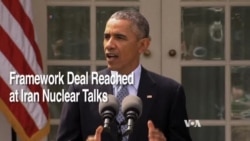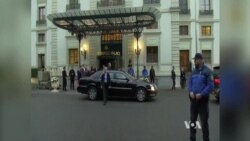Iranian President Hassan Rouhani has praised the framework agreement reached Thursday on Tehran's nuclear program, calling it a "day that will remain in the historical memory of the Iranian nation."
Addressing his nation on live television Friday, Rouani said the framework agreement reached with six world powers will protect Iran's nuclear rights and provide relief from international sanctions.
The deal acknowledges Iran's right to enrich uranium on its own territory – for peaceful purposes, Rouhani emphasized.
"Some think that we must either fight the world or surrender to world powers. We say it is neither of those," he said. "There is a third way: We can have cooperation with the world.''
The Iranian president vowed Iran will honor all of its pledges in the agreement "as long as the other side honors its promises as well."
Centrifuges have to "spin" while "peoples' lives and the economy have to move forward," Rouhani said.
Meanwhile, the White House said President Barack Obama is speaking about the framework deal with all four leaders of Congress, where Republican lawmakers skittish about an agreement have threatened to pass new sanctions against Iran.
White House spokesman Eric Schultz said Republican criticism of the deal has been "mostly thoughtful."
Schultz also said Obama would never approve a deal that was a threat to Israel. The spokesman said Israeli Prime Minister Benjamin Netanyahu's concerns about the deal have been raised and "we understand his position."
The deal followed eight days of intensive talks in Lausanne, Switzerland, and sets the stage for a final agreement to be completed by June 30.
After it was announced Thursday, cheers erupted in Tehran. Hundreds of Iranians took to the capital's streets, honking car horns and waving flags, amid fresh hopes the country's international isolation would end soon.
Foreign Minister Javad Zarif returned from Switzerland on Friday to another festive crowd of supporters in the capital. Some held signs proclaiming "Long live Doctor Zarif, Long Live [Iranian President Hassan] Rouhani."
Obama hails deal
Obama praised the framework nuclear agreement as "historic," saying if fully implemented it will make the world safer and cut off Tehran's path to a bomb.
Speaking from the White House Thursday, Obama heralded the agreement as "a good deal that meets our core objectives."
"Iran will face strict limitations on its program, and Iran has also agreed to the most robust and intrusive inspections and transparency regime ever negotiated for any nuclear program in history," he said.
Skeptics, including Israel and Saudi Arabia, say the United States and its partners would be giving Iran too many concessions and leave it with the means to build a nuclear weapon.
In a phone call with Obama, Saudi King Salman voiced hope that a final settlement on the nuclear dispute would "strengthen the stability and security of the region and the world," official Saudi media reported Friday.
Deal details
Key Highlights of Nuclear Deal
Key Highlights of 2014 Nuclear Deal
- Two-thirds reduction of installed centrifuges
- No uranium-enrichment over 3.67 percent purity for 15 years
- No uranium-enrichment facilities for 15 years
- One-year bomb breakout (production) time
- Fordow nuclear facility conversion; Arak reactor redesign
- Regular IAEA access
- Sanctions relief follows verified compliance
Under the deal, Iran will receive relief from international sanctions in exchange for cutting back its uranium enrichment program, which the West has long feared could be used to make a nuclear weapon.
Iran's breakout time, the minimum amount required to produce a nuclear bomb, will be extended "to at least one year, for a duration of 10 years," according to a U.S. fact sheet. The breakout time is currently estimated to be two to three months.
Tehran also agreed to reduce by about two-thirds the amount of its installed uranium enrichment centrifuges. "Iran will go from having about 19,000 installed today to 6,104 installed under the deal, with only 5,060 of these enriching uranium for 10 years," the fact sheet said.
The deal, which boosts U.N. nuclear inspections, requires Iran to neutralize much of its stockpile of highly enriched uranium. The Islamic Republic must convert the Fordo underground nuclear facility so it cannot cannot enrich uranium and must redesign its Arak reactor to prevent the production of weapons-grade plutonium.
Zarif: 'No need to spin'
This week's negotiations lasted two days longer than originally planned, casting doubt on whether an agreement could be reached. Even after the deal, signs emerged suggesting that a final, comprehensive pact would be difficult to clinch.
Late Thursday, Iranian Foreign Minister Zarif complained about the U.S. issuing its own summary of the agreement. "The solutions are good for all, as they stand. There is no need to spin using 'fact sheets' so early on," he said via Twitter.
On Friday, Zarif also insisted international sanctions would be lifted immediately upon reaching a final deal, saying any U.S. official who suggested otherwise was wrong. The comments reflect an area of disagreement as both sides attempt to draft a final text.
French Foreign Minister Laurent Fabius on Friday acknowledged in an interview with the Europe 1 radio station that the tricky issue of when crippling sanctions on Iran would be lifted is "not yet solved."
Hard-liners in Iran also slammed the agreement. Hossein Shariatmadari, an adviser to Supreme Leader Ayatollah Ali Khamenei, was quoted in Iranian media as saying Tehran exchanged a "ready-to-race horse for a broken bridle."
In his White House speech Thursday, Obama stressed that many key details will be finalized over the next three months, saying "nothing is agreed to until everything is agreed." He also warned that "if Iran violates the deal, sanctions can be snapped back into place."
Obama slams critics
Obama also used his White House Rose Garden speech to lash out at his critics in Congress who are opposed to the deal.
"The issues at stake here are bigger than politics," he said. "These are matters of war and peace, and they should be evaluated based on the facts and what is ultimately best for the American people and for our national security," he said.
Republican lawmakers have repeatedly threatened to pass new sanctions against Iran, a move Iran says would kill any deal. If this happens, Obama said, "then it's the United States that will be blamed for the failure of diplomacy."
The president also said he spoke with Israeli Prime Minister Benjamin Netanyahu, who is one of the biggest opponents of the nuclear talks. White House officials say Obama told Netanyahu that significant progress was made in cutting off Iran's path to a bomb. Israeli officials say the prime minister told the U.S. leader that the deal would "threaten the survival of Israel."
Iran repeatedly has said it's not interested in building a nuclear bomb, and the country's Islamic leaders have issued rulings banning such weapons. But the moves have been unable to persuade Western critics who say certain elements of Iran's nuclear program have no clear non-weapons-related utility.
WATCH: Related video report by Heather Murdock











